Campo’s Corner: Where State of Origin I was won and lost
State of Origin I has been played and won, now it’s time to work out why it all went down the way it did in a post-match edition of Campo’s Corner.
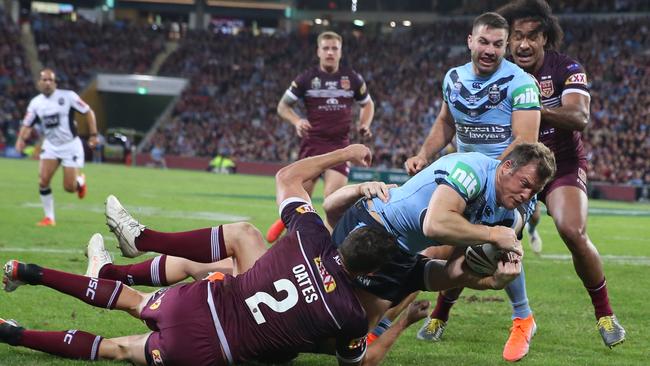
Blues
Don't miss out on the headlines from Blues. Followed categories will be added to My News.
SLAMMED: Gus savages Mitchell
The dust has settled (for now) and all that’s left is to pick Origin I apart and try to figure out why Queensland were able to overwhelm New South Wales and take a 1-0 series lead.
In a special edition of Campo’s Corner we’re strapping on the Matt Sing headgear, launching off a couple of Shaun Timmins field goals and diving as deep as possible into every little bit of Origin I.
THE MINUTES THAT MATTERED
The biggest job any coach has during a match is the substitutions and it’s a balance that even the best in the business can get wrong sometimes.
Brad Fittler and Kevin Walters took two different approaches to their benches on Wednesday night and for mine it was these calls that decided the match.
Fittler went with a plan that had a lot of moving parts and clearly has the courage to adjust that on the fly according to what he thinks the team needed. But sometimes these gambles can backfire.
Tyson Frizell is one of the best backrowers in the NRL but Fittler seems to have his heart set on using him a certain way at Origin level and it cost the Blues dearly in this defeat.
As he did in all three matches last year, Frizell played the opening 25 minutes on the right edge and looked to be in great touch.
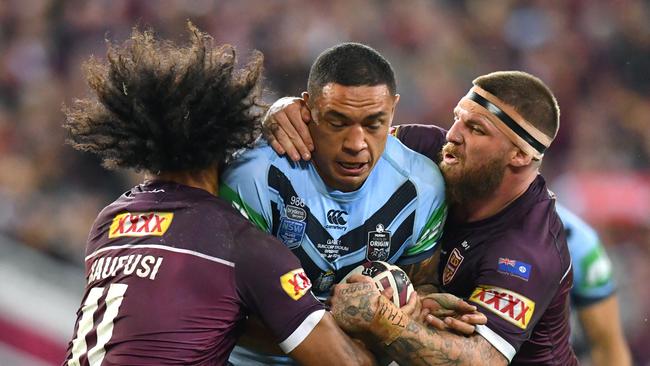
His work from the inside cut down the room for Kalyn Ponga and played a huge role in keeping the Queensland fullback quiet in the first half.
Frizell physically imposed himself with every carry and tackle in the all-action style that has made him a certain Origin selection when fit. But after being one of the best on ground early he was taken off for Angus Crichton and did not return until the final 15 minutes and even then as a middle forward.
Fittler clearly wants to get big minutes for Crichton but they shouldn’t be coming at the expense of Frizell. In 52 minutes of game time Crichton managed 55 metres from eight runs and made 36 tackles, missing five. He wasn’t poor but he didn’t stand out either and with that amount of gametime he had to be better.
The Blues needed impact and he couldn’t provide it. Frizell is a sledgehammer of a forward, a breaker of men, and Crichton has never shown the same capabilities.
In 40 minutes Frizell made more runs (12) for more metres (99) and given how the Blues struggled for yardage and defensive sting in the second half his impact would have been invaluable. Perhaps Fittler didn’t feel comfortable asking Frizell, who has battled injury for much of the year, to play a longer stint but even then, using him in the middle when he’s such a danger out wide is a hard move to figure out.
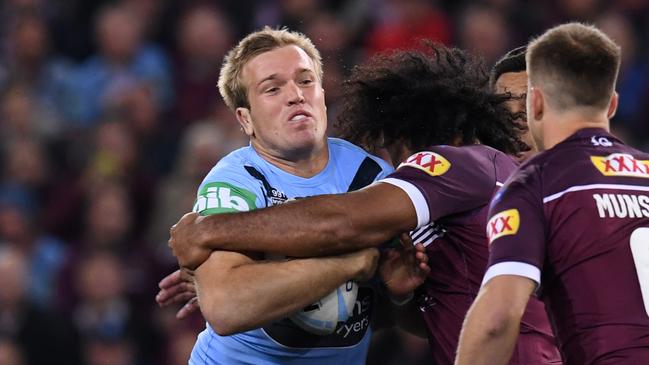
This is not a problem unique to Fittler’s reign though – Laurie Daley was also fond of putting Frizell into the middle midway through games for reasons that remain unclear.
Likewise, the age Jake Trbojevic spent on the bench must also come into question. He played 50 minutes with an opening stint of roughly 25 minutes before returning for the final quarter but should have played closer to 70.
Payne Haas did a capable job once he came on and is known for his motor at club level but the big Bronco was well and truly gassed after the heavy defence the Blues had to endure in the early stages of the second half. Haas made 27 tackles in his 40 minutes of playing time, almost as many (31.1) as he averages for the Broncos where he averages 64 minutes per game.
Why Fittler did not lean on the more experienced Trbojevic to help lock up the middle after the Blues were under siege is difficult to figure out.
Haas was solid enough with ball in hand, grinding out 59 run metres from nine carries, and worked hard but showed little of the impact he’s shown at club level. The match seemed a little quick for him, especially given how many minutes he was asked to play, which shouldn’t be a surprise given his inexperience.
Haas played like a grinder but the Blues didn’t need grinders off the bench, they needed impact – look at Cam Murray’s far more accomplished debut as a guide.
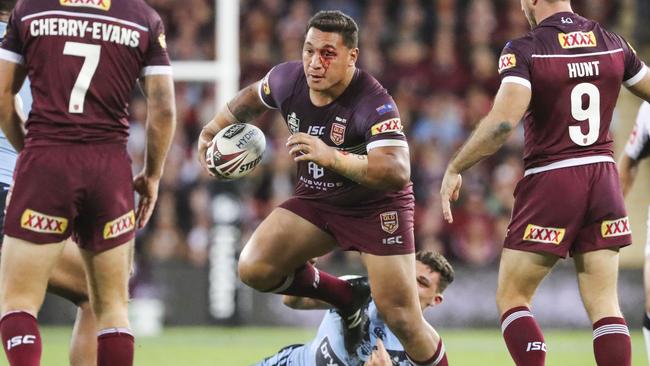
Trbojevic was one of the Blues best forwards last year, when he came off the bench and played 60 straight minutes to close the match.
It was another tricky balancing act Fittler couldn’t quite pull off. To say nothing of the fact that David Klemmer, who was the best forward on the ground for as long as he happened to be on the ground, played 52 straight minutes before coming off and not returning.
Kevin Walters kept his bench rotation far more simple and Queensland were better for it. No Maroons bench forward played more than 33 minutes and his starting middle forwards – Josh Papalii, Jai Arrow and Josh McGuire – all played between 41 and 59 minutes.
Papalii in particular was brutal in his second stint and played a big part in helping Queensland gain the ascendancy.
He has been one of Queensland’s best forwards for some time, even when he was a backrower acting as a bench middle, but now he is the leader of their pack and his lumbering runs, combined with punishing defence, set the tone in the second half.
Arrow was quiet in his first stint but much stronger in his second while McGuire continued his excellent return to form this year with his best Origin since 2017.
Joe Ofahengaue and David Fifita were both terrific in their short stints, they made a combined 177 metres in 59 minutes. Compare that to Haas and Crichton, who made 109 combined metres in 91 combined minutes.
BLUES HALVES UNDER FIRE
Even before the fulltime siren rang on Wednesday night the knives were out for Nathan Cleary and Cody Walker. When an Origin is lost, blame the halves, that train is never late, but both Blues men had an unhappy time but for vastly different reasons.
Cleary struggled to create anything of real note despite the ruck speed the Blues enjoyed early. In the early stages he could have created a try for a flying James Tedesco with a grubber but overcooked it just a touch.
He took on the line well in the lead up to the Josh Morris try but that was about it as far as his attacking output was concerned. He defended stoutly and tried hard but that’s not enough.
With Walker not a noted field position kicker Cleary had to take control in that regard and failed to do so, especially as the game wore on.
He couldn’t create pressure inside the attacking 20 via repeat sets and he couldn’t kick the Blues out of trouble when they worked it out of their own end.
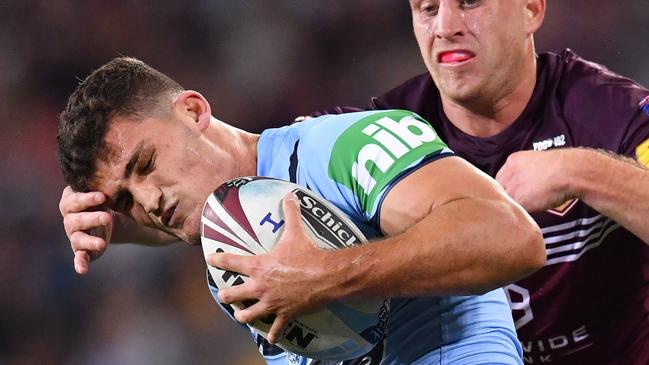
It was a tough outing for the Panther as he seemed unable to take control of the match or put his stamp on the play. Damien Cook kicked a lot out of dummy half and in back to back sets late in the second half Jack Wighton and Boyd Cordner were forced to hoof it down field in frantic last tackle fashion.
Between the 49th and the 60th minute of the game, Cleary did not touch the ball once. Between the 60th and the 73rd minute he touched the ball four times. That’s a 24 minute stretch with four touches. That’s reminiscent of the worst of Mitchell Pearce, when the Roosters halfback seemingly let matches pass him by.
Walker has attracted heavier criticism but arguably showed more with less. Cleary wasn’t able to put his stamp on the game but Walker was flat out getting his hands on the ball in a quiet display.
Having said that, Walker did play a part in Jake Trbojevic’s late try and threw a good pass to get Latrell Mitchell away late in the match. He struggled to combine with his outside men on a consistent basis but was given little by the way of set up.
Fittler’s biggest gamble came when he hooked Walker for Jack Wighton with 25 minutes to go. If Fittler believed Walker was struggling to impose himself on the game, which he was, then taking him out is fair enough. But at the same time, Walker returned once the Blues needed to score quickly, after just 10 minutes on the bench.
Either Walker is the team’s best option at five-eighth or he’s not, either he is the one who can create or he isn’t and either he was the man to pull the Blues out of the hole or he wasn’t. It can’t be had both ways.
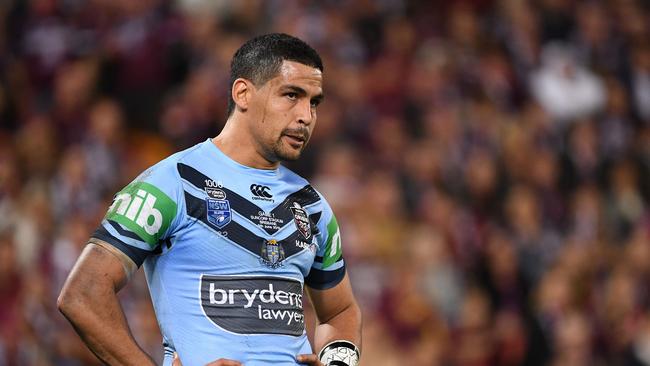
Compare Walker and Cleary to Cameron Munster and Daly Cherry-Evans, who do have an extra game under their belts.
The two Queenslanders have already struck a fine balance with Cherry-Evans as the organiser and Munster freed up to run, which he does early and often. Running halves almost always have success in Origin and Munster’s style suits the interstate arena extremely well.
The Queensland dynasty is built on the corpses of discarded New South Wales halves and in days past there is no doubt Walker and Cleary would both be gone for Origin II.
Fittler does not strike as that sort who would cut and run, he’ll dance with the one what brung him.
We’re a long way away from Perth but I would guess Cleary and Walker survive the axe – but if the series is lost across the Nullabor neither is likely to make it to Origin III.
VARIETY THE SPICE OF ORIGIN
The best weapon the Blues have is James Tedesco and his combination with Damien Cook but in Origin I it seemed their only weapon. Unless there was a quick play the ball from which Cook could take off or Tedesco simply beating somebody one-on-one the Blues rarely looked threatening.
That’s not to say they should suddenly embrace 1001 set plays but the lack of creativity from the halves really hamstrung them. Queensland, in contrast, were piloted confidently by Daly Cherry-Evans, who fed his outside men all night and ensured the Maroons played with great width.
Queensland’s attack down their left side, which was anticipated to be their best weapon, struggled in the first half as Cameron Munster and Kalyn Ponga couldn’t quite combine. Munster’s running game was dangerous as ever but there were times when he ran Ponga out of room, cutting down the time the fullback had to create things for himself.
In a credit to Queensland’s ability to adapt, this problem vanished in the second half. Cherry-Evans either went directly to Ponga, as for the second Gagai try, or Munster simply gave it much earlier, as for the Oates try.
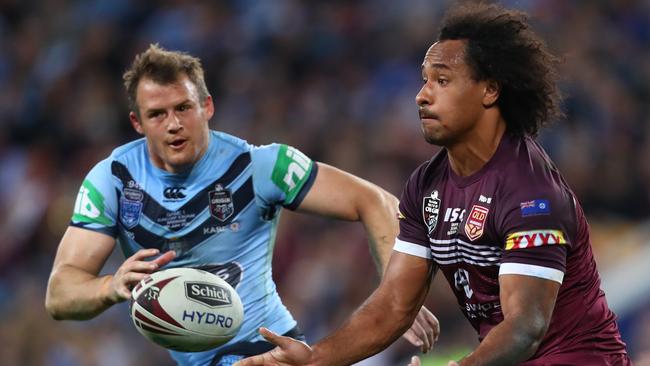
The latter was a well-constructed piece of play, the type of thing the Blues saw very little of all night. Using the backrower as a pivot for a sweeping runner, usually a fullback, is a play Melbourne have used to great impact for many years so it was no surprise to see two Storm men – Munster and Kaufusi – combine to pull it off.
Josh Morris had a fine return to Origin but this was his sole blemish as he blew the read and stripped the Blues of numbers.
Putting those kind of patterns together is difficult in a rep side but even one or two known formations can make all the difference, just as something to fall back on.
The Blues two tries came from Tedesco managing to put a move on Munster and create numbers and McGuire racing out of the line and missing Walker – they have little in terms of structure in the attacking 20.
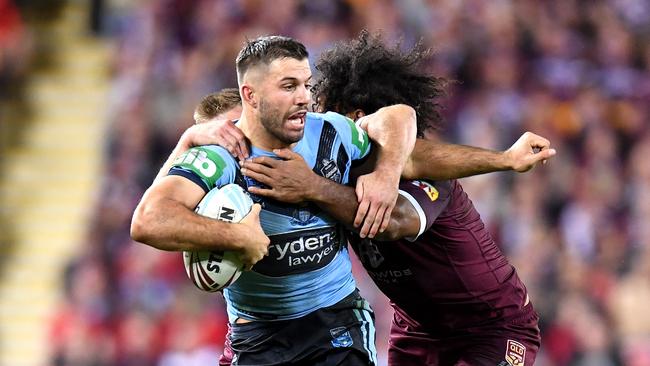
If that’s a failure of the game plan or the halves who can say, but it was notable how little football Walker saw in the red zone.
Case in point was early in the second half. The Blues got a penalty in the 43rd minute on the last tackle for a crusher from McGuire.
They had a fresh set on the Queensland line with Fittler’s halftime message still ringing in their ears but couldn’t come up with a repeat set, let alone a try. As the tables turned Queensland took their chances when New South Wales could not, and chances taken inevitably turns into games won.
QUEENSLAND GROW IN THE TELLING
On Ponga, he was my choice for man of the match, ahead of Gagai and Papalii for Queensland and Cook and Tedesco for the Blues.
It took a little time for Ponga to warm to the match but once he, Munster and Cherry-Evans found their rhythm they combined very well and Ponga ended up throwing two fine passes for tries, including one to Gagai on the right side, a rare venture for Ponga from his favoured left.
Throw in the heavy tackle on a flying Latrell Mitchell late when the Blues centre looked to be coming down the hill and it was an excellent shift from Ponga, who also kept himself involved around the ruck as often as he could.
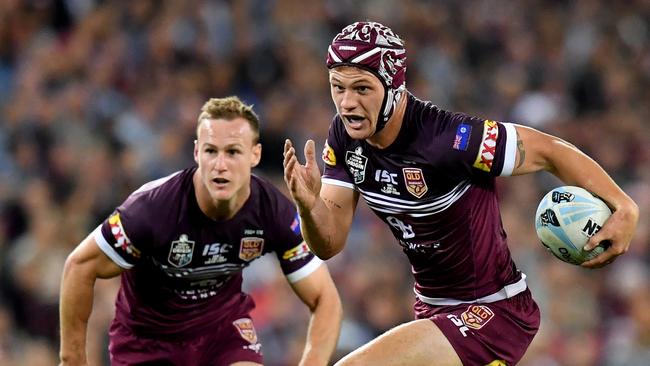
Ben Hunt didn’t feature in man of the match discussions but he also did well to recover after a less than stellar opening. Getting through the 80 minutes always seemed like more of a pipe dream than a reality for Hunt but he made it through, even though he looked ready to keel over at the end of the first half.
Hunt’s service from dummy half left something to be desired more than once but he provides Queensland with another playmaker and link man in the middle of the field, which is always a boost, and he gave the Maroons something of a running threat.
OTHER STUFF
• Jack Wighton got put on a hiding to nothing when asked to go out and turn the tide with 25 to go but if Fittler didn’t have the confidence in Wighton to do it he wouldn’t have picked up. Fittler’s faith in his player’s abilities is his greatest strength but it can backfire – it was a lot to ask of Wighton, who has come so far this season but still has barely half a dozen games as a five-eighth to his name.
Wighton can be an all or nothing type player and his attempted pass to Josh Addo-Carr was an all or nothing type play. Some fellas can’t go near a cliff without jumping off
When Wighton shaped to throw it I thought it was going to work, it’s not a clanger of the likes of the brain explosion against the Dragons in 2016, but it will haunt the talented Raider for some time.
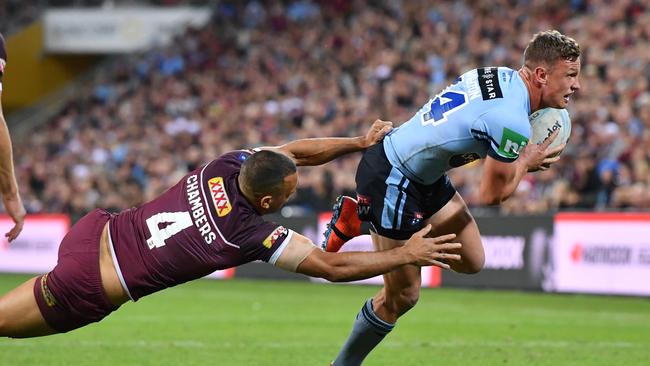
• Tom Trbojevic is certain to return for the Blues in Origin II if he’s fit but will it be for Josh Morris or Nick Cotric?
Cotric was solid on debut, especially in the first half when he formed a strong one-two punch with Josh Addo-Carr and James Tedesco coming out of the Blues end while Morris had a blinder, scoring a try and looking dangerous with several touches.
Trbojevic has played centre for Australia and his work as a winger is well known – right now, given how Morris played, Cotric seems the man most likely to drop out.
• Morris gets his own bullet point for no other reason than he’s an absolute Origin hero. I would trust him with my life.

• Will Chambers proved there’s life in old Slick Willie yet, getting one back on Latrell Mitchell by clearly winning their head to head match up. Mitchell was all at sea on several reads as Chambers made a series of clean breaks, with the off-ball work of Chambers (changing direction as the pass to him was still in the air) a real highlight.
Mitchell showed his one great weakness as a player - if the game does not come to him he will not go and get it - but even in the good spots he was out of sorts.
• The way Dane Gagai lifts when he plays for Queensland should be studied in a laboratory.
THE GOLDEN HOMBRE
Is there anything more thrilling than when a big man gets into the clear and attempts an ill-advised dummy, or perhaps a chip kick?
Is there anything greater than when a large lad decides the time has come for him to show the world the ball skills he knows lurk deep within?
Is there anything that lifts the spirit more than a hefty fellow crashing across the stripe for his second NRL try in his 179th first grade match?
I say no, and to honour these big fellas each and every week of the year, which many have dubbed #BigManSeason, we hand out The Golden Hombre, named after Todd Payten, the biggest halfback God ever created.
Sadly there were few Golden Hombre nominees in Origin I, possibly because Andy Ruiz took all the big man energy in his stunning upset of Anthony Joshua on the weekend. In lieu of anything wacky we’re going to go with Payne Haas’s excellent cover tackle on Dane Gagai late in the first half when the Queensland winger looked set to score yet another runaway try.

